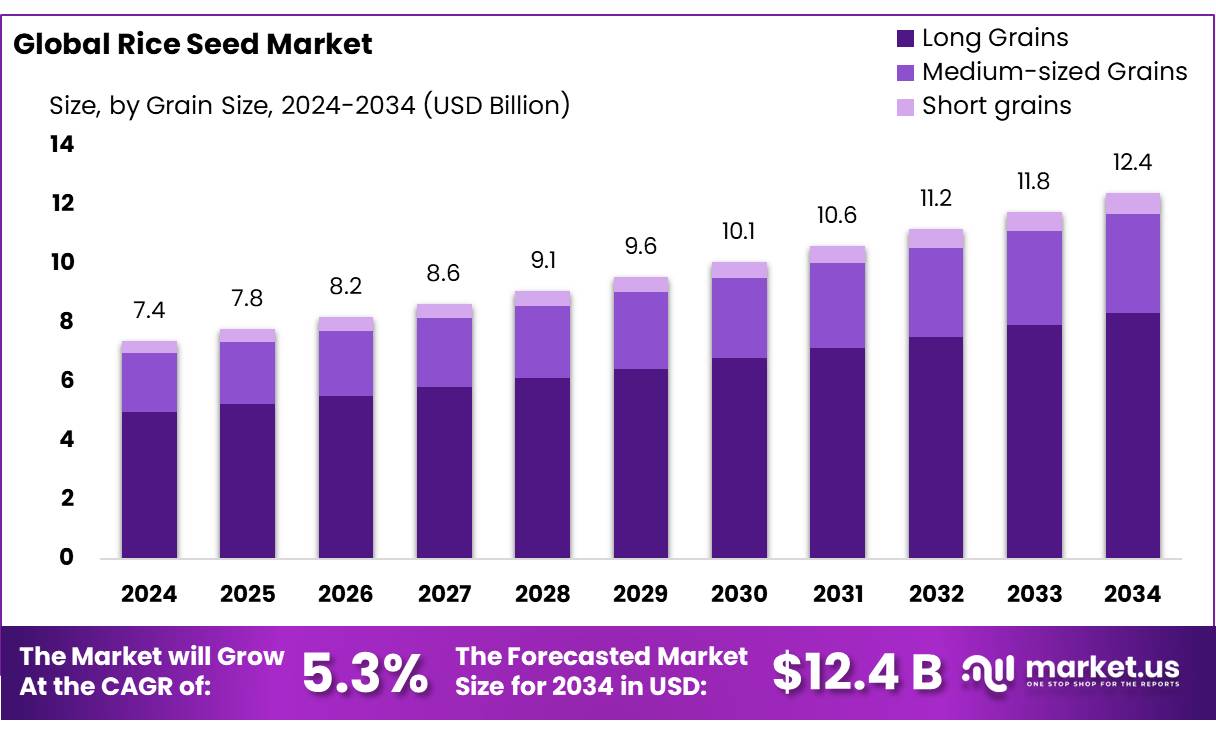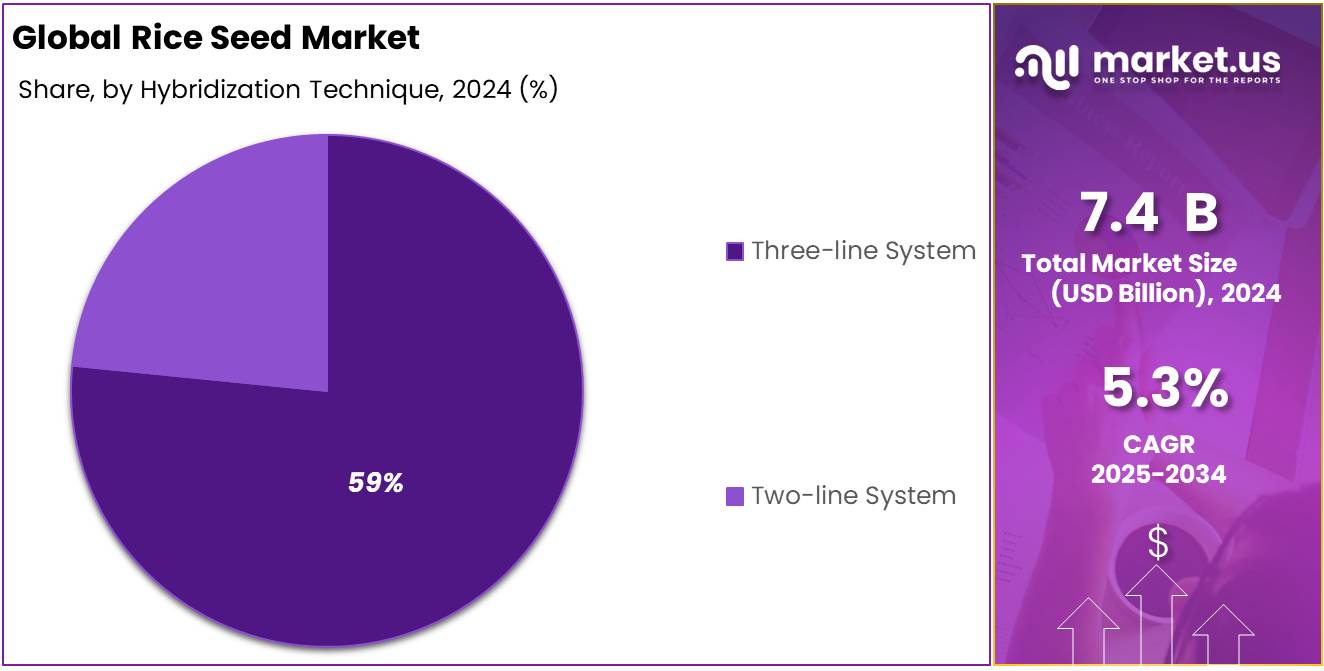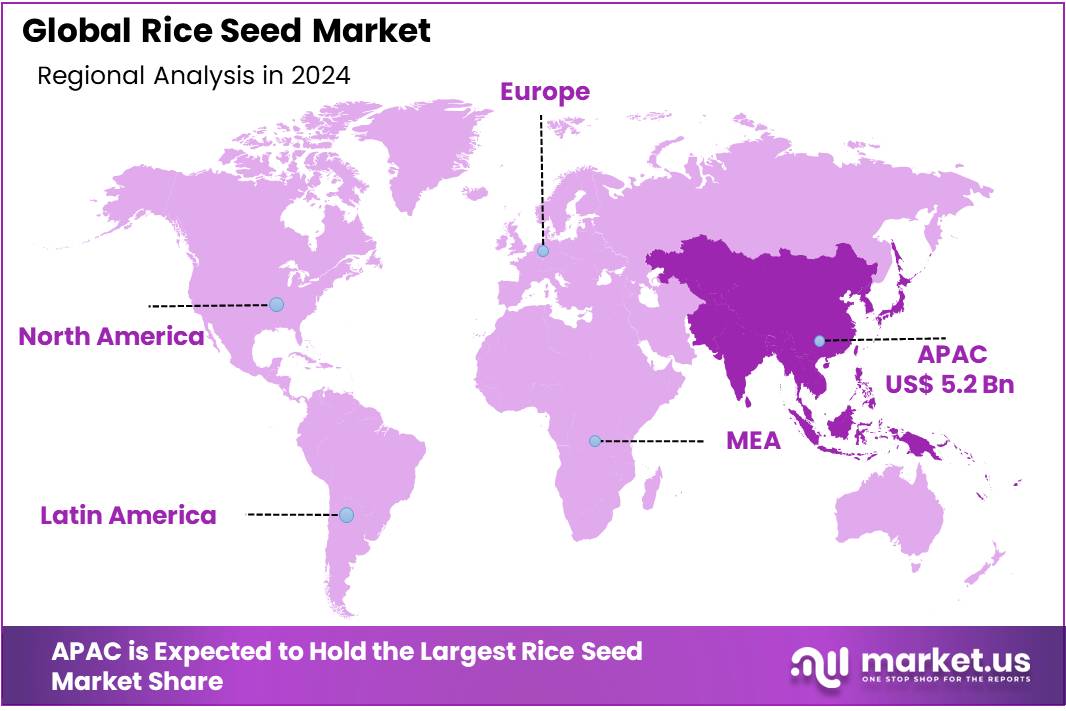Global Rice Seed Market By Grain Size (Long Grains, Medium-sized Grains, Short grains), By Treatment ( Treated, Untreated), By Hybridization Technique (Three-line System, Two-line System) , By Region and Companies - Industry Segment Outlook, Market Assessment, Competition Scenario, Trends, and Forecast 2025-2034
- Published date: June 2025
- Report ID: 150728
- Number of Pages: 210
- Format:
-
keyboard_arrow_up
Quick Navigation
Report Overview
The Global Rice Seed Market size is expected to be worth around USD 12.4 Billion by 2034, from USD 7.4 Billion in 2024, growing at a CAGR of 5.3% during the forecast period from 2025 to 2034.
The rice seed concentrates industry in India plays a pivotal role in ensuring food security, enhancing agricultural productivity, and supporting the livelihoods of millions of farmers. As the world’s second-largest producer and the leading exporter of rice, India is witnessing significant advancements in seed technology, driven by both public and private sector initiatives.
India stands as the world’s second-largest producer and the largest exporter of rice, accounting for over 40% of global rice exports. The country’s rice seed industry is characterized by a blend of public and private sector involvement, with entities like the National Seeds Corporation (NSC) and state agricultural universities leading research and development efforts.

For instance, NSC produces approximately 150,000 tons of seed annually, supporting the vast network of Indian farmers. State initiatives, such as the Telangana government’s distribution of quality seed kits to over 40,000 farmers, further bolster the seed supply chain.
Government Support Indian government has committed substantial resources to the agricultural sector. In the fiscal year 2025-2026, the agriculture budget is set to increase by over 15%, totaling approximately ₹1.75 trillion (about $20 billion). This funding aims to enhance seed quality, irrigation infrastructure, and storage facilities.
Technological Advancements in adoption of Direct Seeded Rice (DSR) techniques, which reduce water usage and labor costs, is being promoted through financial incentives. For example, farmers in Punjab are offered ₹1,500 per acre for adopting DSR methods.
Key Takeaways
- Rice Seed Market size is expected to be worth around USD 12.4 Billion by 2034, from USD 7.4 Billion in 2024, growing at a CAGR of 5.3%.
- Long Grains held a dominant market position, capturing more than a 67.4% share of the global rice seed market.
- Treated held a dominant market position, capturing more than a 78.2% share of the global rice seed market.
- Three-line System held a dominant market position, capturing more than a 59.2% share in the global rice seed market.
- Asia-Pacific (APAC) region held a dominant position in the global rice seed market, accounting for a substantial 71.2% share, equivalent to approximately USD 5.2 billion.
By Grain Size
Long Grain Rice Seeds dominate with 67.4% share in 2024, driven by high global demand and yield efficiency.
In 2024, Long Grains held a dominant market position, capturing more than a 67.4% share of the global rice seed market. This dominance is largely due to the widespread cultivation and consumption of long grain varieties such as Basmati and Jasmine, which are preferred in major markets like India, Pakistan, Southeast Asia, and parts of the Middle East and North America. These grains are known for their slender shape, aromatic quality, and higher export value, making them a preferred choice for both farmers and exporters.
Their adaptability to different climatic conditions and strong yield performance further contribute to their widespread adoption. As a result, seed companies and government agricultural bodies have consistently promoted long grain varieties through hybrid seed development and improved agronomic practices. The continued focus on boosting rice exports and ensuring food security across Asia and Africa is expected to keep the demand for long grain rice seeds high through 2025.
By Treatment
Treated Rice Seeds lead with 78.2% share in 2024, driven by improved disease resistance and higher productivity.
In 2024, Treated held a dominant market position, capturing more than a 78.2% share of the global rice seed market. This strong preference for treated seeds is mainly due to their ability to offer protection against seed- and soil-borne diseases, pests, and fungal infections during early plant growth. Farmers across both developed and developing nations are increasingly opting for treated seeds to ensure better germination rates, uniform crop establishment, and stronger resistance to biotic stress, especially in unpredictable climatic conditions.
The treatment process often includes fungicides, insecticides, or bio-enhancers, which contribute to healthier seedlings and improved overall yield. Government agricultural departments and extension services have also been promoting the use of treated seeds through subsidy programs and awareness campaigns, especially in high rice-producing regions like India, China, Vietnam, and parts of Sub-Saharan Africa. As more farming communities focus on crop quality, input efficiency, and food security, the adoption of treated seeds is expected to remain high into 2025.
By Hybridization Technique
Three-line Hybrid System leads with 59.2% share in 2024, supported by high seed purity and stable yield performance.
In 2024, Three-line System held a dominant market position, capturing more than a 59.2% share in the global rice seed market by hybridization technique. This method, which relies on a cytoplasmic male sterility (CMS) line, a maintainer line, and a restorer line, has been widely adopted due to its proven success in producing high-yielding and genetically stable hybrid rice varieties. Countries like China and India have used this technique extensively over the past two decades, particularly in large-scale commercial farming, where uniformity and output consistency are critical.
The Three-line System offers farmers reliable seed performance, with improved tolerance to environmental stress, better grain quality, and enhanced resistance to pests and diseases. Agricultural research institutions have also favored this method due to its structured breeding process and higher levels of hybrid vigor. As a result, in 2025, this technique continues to remain the preferred choice for hybrid seed development in key rice-producing nations, reinforcing its strong market share.

Key Market Segments
By Grain Size
- Long Grains
- Medium-sized Grains
- Short grains
By Treatment
- Treated
- Untreated
By Hybridization Technique
- Three-line System
- Two-line System
Drivers
Government Support for Seed Quality and Accessibility
One of the most significant driving factors for the rice seed market in India is the robust support from government initiatives aimed at improving seed quality and accessibility for farmers. These programs are designed to ensure that farmers have access to high-quality seeds, which are crucial for enhancing productivity and sustainability in rice cultivation.
A notable example is the Telangana government’s initiative to distribute quality seed kits to farmers. In 2025, the Professor Jayashankar Telangana State Agricultural University, in collaboration with the state’s agriculture department, launched a program titled “Distribution of Quality Seeds from the Agricultural University to Every Village.” This initiative aimed to distribute seed kits for five major crops, including rice, to approximately 40,000 progressive farmers across 11,000 villages.
The university prepared around 10,250 quintals of high-quality seeds, produced under scientists’ supervision during the last rabi season, and packaged them into 6-10 kg packets for distribution. The goal was to foster seed self-sufficiency by encouraging farmers to use these seeds and share their yields in subsequent seasons.
Restraints
High Cost of Hybrid Seeds Limits Adoption by Small Farmers
One major restraining factor in the rice seed market is the high cost of hybrid seeds, which significantly limits their uptake among smallholder farmers. According to the Food and Agriculture Organization (FAO), hybrid rice seeds are typically 10 to 15 times more expensive than traditional inbred seeds, placing them out of reach for many resource-poor growers. In regions where average incomes are low, this cost barrier becomes a critical constraint, resulting in slower adoption rates of advanced seed technologies.
A study conducted in China found that although hybrid rice can improve yields by approximately 4.9%, net income for farmers using hybrid seeds declined by 43.6%. This decline was largely attributed to the additional costs associated with hybrid seeds, as well as the need for more farm labor, pesticides, and fertilizers. For smallholders, who often operate at narrow profit margins, these added expenses may outweigh yield benefits, reducing both profitability and willingness to adopt hybrids.
Governments have attempted to mitigate this challenge with subsidy schemes. In the Philippines, a 50% subsidy on hybrid rice seed was in place through the early 2000s. However, such subsidies have often favoured larger seed companies and were criticized for primarily benefiting corporate interests rather than smallholder farmers. In many developing countries, subsidy programs remain inconsistent or limited in reach, leaving a significant portion of farmers unable to access affordable hybrid seed.
Opportunity
Leveraging Rice Fallow Lands for Oilseed Cultivation
One of the most promising growth opportunities for India’s rice seed market lies in the strategic utilization of rice fallow lands for oilseed cultivation. These lands, which remain uncultivated post-rice harvest, present an underutilized resource that can be harnessed to boost domestic oilseed production and reduce import dependence.
The Indian government’s National Mission on Edible Oils – Oilseeds (NMEO-Oilseeds), launched in 2024, aims to increase oilseed production from 39 million tonnes in 2022-23 to 69.7 million tonnes by 2030-31. A key component of this mission is the promotion of oilseed cultivation in rice fallow areas. Utilizing just one-third of the total Rabi rice fallow area across ten states for oilseed cultivation has the potential to produce an additional 1.03 million tonnes of oilseeds, representing a 7.1% reduction in India’s edible oil import reliance.
This initiative not only aims to enhance domestic oilseed production but also seeks to improve soil health and water use efficiency. By rotating crops and diversifying agricultural practices, farmers can reduce the risk of soil degradation and optimize resource utilization.
The government’s support through the NMEO-Oilseeds mission includes the establishment of 65 new seed hubs and 50 seed storage units in the public sector, as well as the development of over 600 value chain clusters across 347 districts. These clusters will provide farmers with access to high-quality seeds, training on Good Agricultural Practices (GAP), and advisory services on weather and pest management.
Trends
Adoption of Climate-Resilient Rice Seed Varieties
A significant trend shaping India’s rice seed market is the increasing adoption of climate-resilient rice seed varieties. These varieties are engineered to withstand the challenges posed by climate change, such as erratic rainfall, rising temperatures, and increased pest infestations. The government’s proactive approach in promoting these seeds is evident through various initiatives and collaborations.
In August 2024, Prime Minister Narendra Modi launched 109 high-yielding and climate-resilient seed varieties, including those for rice, wheat, vegetables, oilseeds, and cotton. The objective is to sow at least 25% of paddy land with these seeds in the upcoming crop season, thereby enhancing productivity and ensuring sustainability in rice cultivation.
Furthermore, the Indian government has committed to raising the agriculture budget by over 15% in the fiscal year 2025-2026, totaling approximately ₹1.75 trillion (about $20 billion). This substantial increase aims to support the development and distribution of high-quality, climate-resilient seed varieties, along with improvements in irrigation infrastructure and storage facilities.
Regional Analysis
Asia-Pacific Leads Rice Seed Market with 71.2% Share Valued at USD 5.2 Billion
In 2024, the Asia-Pacific (APAC) region held a dominant position in the global rice seed market, accounting for a substantial 71.2% share, equivalent to approximately USD 5.2 billion in value. This dominance is primarily attributed to the region’s status as the world’s largest rice producer and consumer.
Major rice-growing countries such as China, India, Indonesia, Vietnam, Thailand, and the Philippines contribute significantly to both production volume and seed demand. India and China together account for more than 50% of the world’s rice output, with India cultivating over 44 million hectares and producing 135.8 million tonnes in 2022–23, as reported by the Indian Ministry of Agriculture.
Government-led initiatives such as India’s National Food Security Mission (NFSM) and China’s continued investment in hybrid rice programs have accelerated the adoption of high-yielding and pest-resistant seed varieties across millions of hectares. For instance, China has successfully expanded its hybrid rice cultivation to cover over 16 million hectares, enhancing food security and farmer incomes. The region also benefits from extensive public-private partnerships that support research, seed distribution, and training.

Key Regions and Countries
- North America
- US
- Canada
- Europe
- Germany
- France
- The UK
- Spain
- Italy
- Rest of Europe
- Asia Pacific
- China
- Japan
- South Korea
- India
- Australia
- Rest of APAC
- Latin America
- Brazil
- Mexico
- Rest of Latin America
- Middle East & Africa
- GCC
- South Africa
- Rest of MEA
Key Players Analysis
Advanta Limited, a part of UPL Group, is a major player in the global rice seed market, known for its research-driven hybrid and inbred seed varieties. The company has strong operations across Asia-Pacific, especially in India and Southeast Asia. Its rice portfolio includes high-yielding hybrids with improved grain quality and climate resilience. In 2024, Advanta expanded its reach through digital platforms and farmer engagement programs, aiming to increase hybrid seed adoption and strengthen food security in key rice-growing regions.
Ankur Seeds Pvt. Ltd., headquartered in Nagpur, India, is a leading producer of certified and hybrid rice seeds tailored for Indian agro-climatic zones. With a focus on cost-effective, high-germination seeds, the company supports small and mid-scale farmers through localized breeding programs. In 2024, Ankur Seeds emphasized flood- and pest-tolerant rice varieties to address climate variability. The firm continues to enhance its distribution channels and extension services, reinforcing its presence in Northern and Central India.
BASF, a global agrochemical and seed solutions company, plays a key role in the rice seed segment through its advanced trait development and biotechnology platforms. It focuses on hybrid rice seeds with herbicide resistance and superior yield traits. In 2024, BASF partnered with research institutions in Asia to develop rice seeds adaptable to water stress and disease pressures. Its seed innovations are part of an integrated approach combining crop protection and digital tools to improve rice productivity in high-demand markets.
Top Key Players in the Market
- Advanta Limited
- Ankur Seeds Pvt. Ltd.
- BASF
- Bayer AG
- BioSeeds Research India Pvt. Ltd.
- Biostadt India Limited
- Corteva Agriscience
- Hancock Seed & Company
- Horizon Ag, LLC
- NUZIVEEDU SEEDS LTD
- Nuziveedu Seeds Ltd.
- Pioneer
- Rasi Seeds (P) Ltd.
- RiceTec Inc.
- Siri Seeds Pvt. Ltd.
- SL Agritech Corporation (SLAC)
- Super Seeds (P) Ltd.
- Syngenta AG
Recent Developments
In 2024, Bayer’s overall Crop Science unit generated €22.3 billion in revenue, although rice seed sales are part of the broader “Seeds & Traits” segment, which accounted for €8.7 billion in 2024.
In 2024, Ankur Seeds Pvt. Ltd. is a prominent Indian seed company based in Nagpur, focusing on hybrid rice seeds alongside other crops. In the financial year ending March 31,2024, the firm achieved ₹785 crore in annual revenue.
Report Scope
Report Features Description Market Value (2024) USD 7.4 Bn Forecast Revenue (2034) USD 12.4 Bn CAGR (2025-2034) 5.3% Base Year for Estimation 2024 Historic Period 2020-2023 Forecast Period 2025-2034 Report Coverage Revenue Forecast, Market Dynamics, Competitive Landscape, Recent Developments Segments Covered By Grain Size (Long Grains, Medium-sized Grains, Short grains), By Treatment ( Treated, Untreated), By Hybridization Technique (Three-line System, Two-line System) Regional Analysis North America – US, Canada; Europe – Germany, France, The UK, Spain, Italy, Rest of Europe; Asia Pacific – China, Japan, South Korea, India, Australia, Singapore, Rest of APAC; Latin America – Brazil, Mexico, Rest of Latin America; Middle East & Africa – GCC, South Africa, Rest of MEA Competitive Landscape Advanta Limited, Ankur Seeds Pvt. Ltd., BASF, Bayer AG, BioSeeds Research India Pvt. Ltd., Biostadt India Limited, Corteva Agriscience, Hancock Seed & Company, Horizon Ag, LLC, NUZIVEEDU SEEDS LTD, Nuziveedu Seeds Ltd., Pioneer, Rasi Seeds (P) Ltd., RiceTec Inc., Siri Seeds Pvt. Ltd., SL Agritech Corporation (SLAC), Super Seeds (P) Ltd., Syngenta AG Customization Scope Customization for segments, region/country-level will be provided. Moreover, additional customization can be done based on the requirements. Purchase Options We have three licenses to opt for: Single User License, Multi-User License (Up to 5 Users), Corporate Use License (Unlimited User and Printable PDF) 
-
-
- Advanta Limited
- Ankur Seeds Pvt. Ltd.
- BASF
- Bayer AG
- BioSeeds Research India Pvt. Ltd.
- Biostadt India Limited
- Corteva Agriscience
- Hancock Seed & Company
- Horizon Ag, LLC
- NUZIVEEDU SEEDS LTD
- Nuziveedu Seeds Ltd.
- Pioneer
- Rasi Seeds (P) Ltd.
- RiceTec Inc.
- Siri Seeds Pvt. Ltd.
- SL Agritech Corporation (SLAC)
- Super Seeds (P) Ltd.
- Syngenta AG










